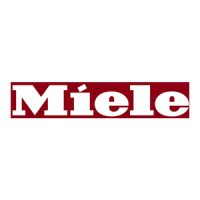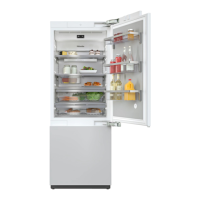Do you have a question about the Miele KF 2902 Vi and is the answer not in the manual?
Defines the intended domestic and similar residential environments and prohibited uses for the appliance.
Details safety measures to prevent injuries or hazards related to children and the appliance.
Covers coolant safety, handling during transport, and installation room requirements.
Ensures safe electrical connection, grounding, and avoidance of improper accessories.
Covers safety during built-in, disconnection, water connections, and part replacement.
Provides guidelines on climate class, air vents, food storage, and handling frozen items.
Advises against using specific cleaning agents and methods to prevent damage.
Covers safe transport procedures and environmentally sound disposal of the old appliance.
Guidelines for safe and environmentally friendly disposal of packaging materials.
Instructions for proper and safe disposal of the old appliance to protect health and environment.
Recommends a dry, well-ventilated room and advises on placement relative to heat sources.
Specifies the suitable climate classes and room temperature ranges for optimal appliance performance.
Provides important notes regarding humidity, ventilation, and appliance stability.
Details requirements for adjoining cabinetry, including fixation to the structure.
Ensures the niche floor is strong, rigid, smooth, and can support the appliance's weight.
Highlights the importance of adequate ventilation to prevent overheating and ensure efficiency.
Advises on the fixed hinge and contacting service for hinge changes.
Explains options and requirements for installing appliances side-by-side.
Details requirements for connecting to the water supply, including regulations and technician use.
Provides key dimensions for electrical and water connections within the installation space.
Specifies space requirements when appliance doors are opened to 90° or 115°.
Lists the dimensions for various cabinet front sizes used with the appliance.
Provides an overview of the building-in process, safety warnings, and required tools.
Lists all necessary tools for the installation process.
Specifies maximum permitted weights for upper and lower cabinet fronts to prevent hinge damage.
Ensures the niche is square and aligned using a spirit level before appliance installation.
Covers checks for dimensions, connections, surroundings, and niche wall criteria.
Outlines necessary steps before installation, including removing accessories and checking for damage.
Details securing the niche with anti-tip brackets to prevent tipping.
Guides on carefully pushing the appliance into the niche and removing the toe-kick grille.
Explains how to align the appliance using installation aids and adjustable feet.
Provides methods for securing the appliance at the top or sides within the niche.
Details steps for preparing and removing installation aids from appliance doors.
Guides on attaching and aligning cabinet fronts using trims, spacers, and bolts.
Instructions for assembling and installing covers in the gap above the appliance.
Details on installing the toe-kick grille and cover.
Explains how to limit the door opening angle to 90° if needed.
Covers connection to the water supply, pressure, quality, and safety precautions.
Provides instructions for safe electrical connection, grounding, and power supply requirements.
Tips on installation location and maintenance for optimal energy consumption.
Guidance on temperature settings to minimize energy usage.
Recommendations on door usage, food placement, and storage for energy efficiency.
Identifies key components and features of the appliance, including door opening and display.
Explains the layout and functions of the main control screen.
Details how to access and navigate through the appliance's settings menu.
Provides a reference for symbols used within the appliance's settings mode.
Lists accessories supplied with the appliance, such as filters and plugs.
Presents a range of optional accessories and care products for the appliance.
Information on covers for cabinet fronts, including connection for dual installations.
Details the kit required for installing multiple appliances side-by-side.
Instructions for initial appliance preparation, including packaging removal and cleaning.
Guidance on cleaning the interior and accessories before the first use.
Helps choose between Push2Open and Pull2Open Door Assistants based on cabinet front type.
Instructions for inserting the Active AirClean filters to neutralize odors.
Information on using the touch display and sensor controls.
Step-by-step guide for turning on the appliance and configuring initial settings.
Procedure for powering on the appliance and initial display messages.
Instructions for turning off the appliance using the On/Off switch.
Guidance on preparing the appliance for long-term non-use, including cleaning and water shut-off.
How to activate or deactivate the keypad lock to prevent unintended changes.
Instructions for switching Eco Mode on or off for reduced energy consumption.
Guide on running a self-test to check for appliance faults or malfunctions.
Steps to switch on the Door Assistant for automatic door opening.
How to adjust the force required to open the door with Push2Open.
Setting the time the appliance door remains open before closing automatically.
Instructions for switching on and using the Pull2Open Door Assistant.
How to set the force required to pull the door open with Pull2Open.
Procedure for deactivating the Door Assistant function.
Guides on connecting the appliance to a WiFi network and the Miele@mobile app.
Information on WiFi connection issues and setup via mobile app or WPS.
Instructions for deactivating, activating, and checking Miele@home connection status.
Procedure for resetting network settings, useful when disposing of the appliance.
How to deactivate Demo Mode, which is for showroom presentation only.
Restores all appliance settings to their factory defaults.
Guides on activating and deactivating Vacation Mode for energy saving.
Instructions for activating and deactivating Sabbath Mode for religious observances.
How to switch on, off, or reset the Water Filter Display reminder.
Instructions for managing the Active AirClean Filter replacement reminder display.
Recommends optimal temperatures for the fridge and MasterFresh zones for food preservation.
Explains the DynaCool feature for even temperature distribution.
Specifies the required temperature for freezing and storing food in the freezer zone.
Step-by-step guide on how to adjust temperatures for different zones.
Details the adjustable temperature ranges for the fridge and freezer zones.
Explains the SuperCool function for rapid chilling of fresh food.
Guides on activating and deactivating the Automatic SuperCool function.
Details the SuperFrost function for quick freezing of fresh food.
Instructions for activating and deactivating the SuperFrost function.
Explains the freezer temperature alarm and its triggers.
How to manually turn off the temperature alarm if it is disruptive.
Details the alarm that sounds when a door is left open for more than 2 minutes.
Procedure to turn off the door alarm before the door is closed.
Instructions for safely removing or repositioning shelves in the appliance door.
Guidance on removing or moving the main shelves within the appliance.
Steps for removing and reinserting the hanging drawer.
Instructions on how to reposition the hanging drawer under different shelves.
Procedure for removing drawers and compartments from the refrigerator section.
Steps for removing freezer baskets for cleaning or access.
How to remove and reinsert the dividing panel within the freezer basket.
Instructions for removing the ice cube tray for cleaning.
Explains how different temperature zones in the refrigerator affect food storage.
Identifies the warmest area (door) suitable for butter and cheese.
Highlights the coldest areas for delicate and perishable foods.
Lists foods sensitive to cold that should not be stored below 40°F (5°C).
Tips on selecting fresh food and considering use-by dates and storage temperatures.
Guidelines for packaging, temperature, and hygiene to prolong food freshness.
Introduces the MasterFresh zone's ideal conditions for fruits, vegetables, fish, meat, and dairy.
Explains the humidity-controlled compartment for fruit and vegetables with moisture adjustment.
Details how to use the moisture regulator to control humidity levels.
Provides instructions on adjusting the moisture regulator for optimal humidity.
Describes the dry compartment's low temperature for storing perishable foods.
Specifies the maximum amount of fresh food that can be frozen in 24 hours.
Explains the benefits of quick freezing for maintaining food quality and moisture.
Guidelines for buying and storing frozen food, including checking packaging and dates.
Tips for home freezing, including suitable foods, blanching, and packaging.
Recommends suitable packaging materials and techniques for freezing food.
Advises on pre-activating SuperFrost function for large freezing loads.
Guidance on positioning food in freezer baskets for optimal freezing.
Provides estimated storage durations for various food groups in the freezer.
Methods and precautions for defrosting frozen food items.
Tips for quickly chilling drinks, with a warning about bottles bursting.
Steps to activate the ice maker, including container placement and settings.
Instructions for independently switching off the ice maker.
Explains the automatic defrosting of the refrigerator section and MasterFresh drawer.
Describes the 'NoFrost' system ensuring the freezer remains ice-free.
Lists cleaning agents to avoid and recommends safe cleaning solutions.
Steps to take before cleaning, including turning off the appliance and removing food.
Guidance on regularly cleaning the interior, shelves, and accessories.
Information on the properties of aluminum frames and how to care for them.
Instructions for cleaning door seals without causing damage.
Advises on regularly cleaning ventilation gaps to maintain energy efficiency.
Steps for cleaning the IntensiveClear 2.0 mesh water filter.
Guide on how to replace the Active AirClean filters and reset the display.
Steps to follow after cleaning, including refitting parts and restarting the appliance.
Explains the reminder for changing the IntensiveClear 2.0 charcoal filter.
Detailed instructions for safely removing and replacing the water filter cartridge.
Guidance on using an IntensiveClear 2.0 mesh filter with external water supplies.
Troubleshooting steps for when the appliance is not working properly, including performing a Self Test.
Addresses issues where the appliance is not cooling or interior lights are off.
Explains causes for the compressor switching on more often, like blocked vents or frequent door openings.
Troubleshooting for the compressor running less often, potentially due to high temperature settings.
Explains that continuous compressor run time can be normal for energy saving.
Advice on preventing and resolving food freezing issues due to moisture.
Addresses alarms sounding, typically due to doors left open.
Troubleshooting when the door alarm does not sound, possibly due to settings or Sabbath Mode.
Guidance on resolving problems with opening the appliance door, including Door Assistant conflicts.
Addresses specific issues with opening the lower appliance door.
Explains how Sabbath Mode affects door opening and Door Assistant functionality.
Troubleshooting reduced food storage life in the MasterFresh zone due to temperature.
Explains the warning message for high freezer temperatures and corrective actions.
Details the 'Close the door' message and how to resolve it.
Explains the display status when Sabbath Mode is active.
Interprets the 'Please contact Miele Technical Service' error message.
Explains the meaning of the Demo Mode indicator and how to switch it off.
Troubleshooting steps for when the ice maker fails to produce ice cubes.
Addresses issues causing small or irregularly shaped ice cubes.
Troubleshooting for ice cubes developing an unpleasant smell or taste.
Guides on troubleshooting water leaks, including faucet and connection checks.
Steps to resolve issues with the interior lighting not functioning.
Describes common noises like humming, gurgling, clicking, and cracking.
Provides solutions for noises caused by uneven installation or touching objects.
Guidance on contacting Miele Service for issues not resolvable by the user.
Information on registering products and viewing warranty terms and conditions.
| Noise level | 42 dB |
|---|---|
| Energy efficiency scale | A to G |
| Annual energy consumption | 326 kWh |











